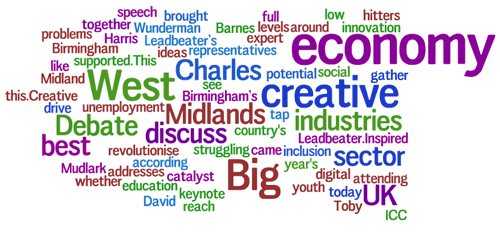Can the Midlands’ Creative Industries revolutionise the UK economy?
simon gray — 2009-11-19, 10:41:33In the best traditions of lazy journalism where the answer to any headline posed as a question is almost certainly ‘no’, the answer to this question – the title of the Big Debate Birmingham (hosted jointly by the Birmingham Post and Birmingham City University) – is almost certainly ‘no’. Fortunately in the course of the afternoon we didn’t even bother trying to answer ‘yes’ to the question and instead got on with the business of discussing our creative industries in relation to ourselves rather than trying to save the rest of the country.

Five key points which emerged for me were:
The days of the global media corporation are over
In the olden days, the media industry was dominated by just a handful of ‘boulder’companies – such as News International, CNN, Associated Newspapers, Guardian Media Group, the BBC, etc. When Channel 4 launched, and when Eddie Shah launched the Today newspaper they were big, national events, because there were so few other media brands. Today, all new media companies are ‘pebble’ companies – small start-ups, with small costs & consequently small profits. New digital television stations come and go almost unnoticed; for most people literally unnoticed, as most people rarely update the channel lists on their televisions / set top boxes. There will be no more new boulder companies.
The paradox of the media industries in free-fall
The media industries – especially those of journalism and of music – are in free fall; profits for record companies and newspaper companies are plumetting, as people turn their backs on their offerings. The paradox of this is that now there is more music, and more journalism (and yes, some blogging should be counted as journalism) around now than ever before. It’s not ‘media’ itself that’s in crisis, but the notion of making a lot of money out of creating media. The ability for media customers to get their media for free (whether via piracy or legitimately) is only part of the story – media creators now take their product to market themselves, bypassing the middleman who used to pay for the creation of the media product, and accordingly take a cut of the price of the product. When you can create your album in your home studio and distribute it across the internet yourself, what value is the record company adding?
For creativity to thrive, experimentation needs to embrace the possibility of failure
This is clearly an obvious statement when written down like that; as with most obvious statements it never occurs to anybody until they see it written down. Common sense, innit? In the olden days, the music business was just that – a business. Record companies invested in artists, and took risks. Sure, manufactured pop has been with us since the beginning of popular music, and the number of experimental pieces even getting in to the hit parade, let alone topping it, can be counted on your hands. But in the olden days record companies used a bulk of the profits they made from chart-topping artists to subsidise artists which were unlikely to be vast earners, because they recognised that a healthy diversity of available music was good for society, good for their own portfolios – and consequently good for their own ultimate balance sheets. Similarly in newspapers, press barons of old saw newspaper proprietorship almost as a civic, philanthropic, duty – they didn’t want their newspapers to make losses, but conversely saw the provision of news and information as having primacy over the provision of profit.
In the modern era, with the boulder media companies, media businesses have become media industries – no longer do they invest in new, experimental talent, no longer do they take risks; by focussing solely on maximising profits they have lost the souls of their industries, with the consequence that their customers are deserting them in droves. Pebble companies are in the best position to experiment – such as BooneOakley, having made their whole website as a series of YouTube videos!
Quality, not quantity
Question – was it worth £6bn to make the Eurostar train journey between London and Paris 40 minutes faster, cutting the travel from 2 hours 55 minutes to 2 hours 15 minutes? Would that money have been better spent on improving the user experience, so passengers didn’t notice the drudgery of spending three hours on a train? First class carriages (with the food and drink to match) throughout the whole train? More cheaper fares (or more cheap first class upgrades)? Does three hours even feel like a long time to spend on a train to Paris anyway?
Don’t underestimate the propensity of users to re-purpose things
There are plenty of objects on Twitter, such as Tower Bridge. It’s cute – it posts a message every time it lifts, and then when it drops again. But what started off as a cute gimmick has actually turned into something useful – if you live in London & need to travel around the area, it’s actually a bit of an inconvenience when the bridge lifts, because it holds up your travel – but if you know it’s lifting, you can re-route your journey. Which people in London are increasingly doing.
Other themes
- The current creative revolution will be as economically & socially disruptive as the industrial revolution – and we’re woefully unprepared for it. Our education system does not encourage creative thinking, significantly unchanged as it has been for the last 200 years.
- The physical space will always matter for making connexions – we should be using the digital space to feed the physical space.
- Always design a thing by considering it in its wider context – a chair within a room, a room within a building, a building on a street, etc.
And finally…
…can you remember a world before smartphones?
#birmingham #economy #socialmedia